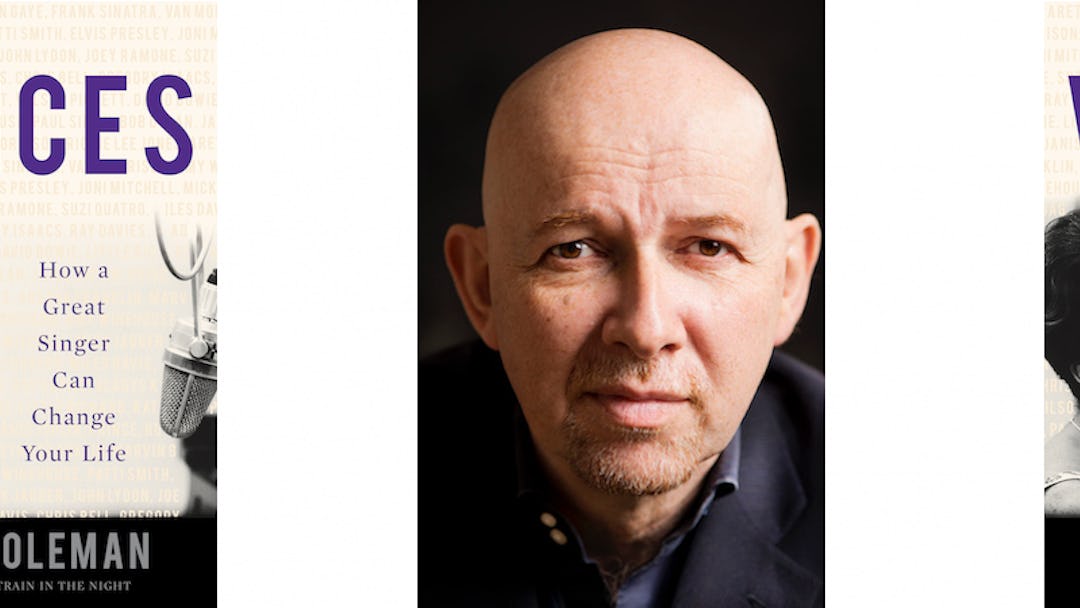When you make your living listening to and writing about music, hearing loss would presumably be a game-ender. That was the dilemma facing British music journalist Nick Coleman, once the music editor of Time Out and music writer for The Independent, when he began to lose his hearing in 2007. But instead, he leaned in, writing about that experience in his 2012 memoir The Train in the Night: A Story of Music and Loss; now he has a new book, Voices: How a Great Singer Can Change Your Life (out now from Counterpoint Press), in which he writes about the music that inspired and moved him – and continues to do so. His subjects include Aretha Franklin, Kate Bush, The Kinks, Billie Holiday, and, in this excerpt, both Patti Smith and Bob Dylan, as he writes about the former’s performance when accepting the latter’s Nobel Prize:
Patti Smith is crammed on to a balcony in a stately ballroom in Stockholm with a small orchestra. She’s up there on behalf of Bob Dylan to accept his Nobel Prize for Literature, and she is going to sing his famous song “A Hard Rain’s A-Gonna Fall” to the accompaniment of small guitar, lap steel, and strings. She is dressed in a black tuxedo and planted like an Easter Island statue. The audience is composed of the great and the good of Swedish culture and the Swedish royal family, who are all done up in formal fig, bibs and tuckers, gowns and jewelry, stoles and tiaras. And medals. They are arrayed formally, as for a state portrait. Smith has no medals though her white shirt beneath the oversized tuxedo is nicely ironed. Her steel-colored hair is long and heavy and parted severely in the middle. She is like Albrecht Dürer, who did not do state portraiture. She is also faintly reminiscent of Buster Keaton. The introduction is strummed artlessly on two chords. Smith sings. The sound she and the guitarist make is as severe as her hairstyle and so is the intent of the words she sings. Yet she is singing beautifully with total involvement, her rich, twangy contralto, with its flattened vowels and its inclination to yodel, driving hard and straight into the language, as if the song had been written this year, the year of all hateful years, 2016. All is suspense. But then, after a couple of minutes, Smith appears for a moment to be overwhelmed. She stops singing. She gulps. “I’m so sorry,” she says, blanching. She tries to carry on. . . “Unh. . .” But it won’t come. She apologizes again and looks up in appeal to the conductor standing above her left shoulder. “I’m sorry. Could we start that section . . . ? I apologize.” She looks out into the audience. They are frozen in their places. “I’m so nervous.” She forces an agonized smile. There is sustained, kindly applause from the audience. You can almost hear the jewelry rattling. And soon enough she goes again with renewed resolve until, a minute or two later, she tries once more, and again looks up at the conductor with the mute appeal of a frightened child. The conductor, out of shot, presumably makes encouraging faces because Smith, suddenly somehow heartened, hooks quickly back into the song and then seems to grow, to expand in her place and to move her hands a little and then her shoulders and then to pace, striding on the spot, no longer an Easter Island statue but a living, breathing, marching embodiment of the hipster-symbolist song lyric she is singing, all about the doom of the world and the love that may save it. She reaches the end of the song in a sea of strings. It is impossible to watch without tears. It is also as great a passage of singing as you are ever likely to hear, if singing is to you not about the observance of musical correctitude and extravagant display and signaled passion and technical virtuosity, but about the inhabitation of the moment up to and including the moment when the moment bursts.
From “Voices: How a Great Singer Can Change Your Life” by Nick Coleman, courtesy of Counterpoint Press. Copyright 2018, Nick Coleman.
